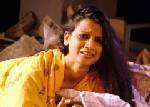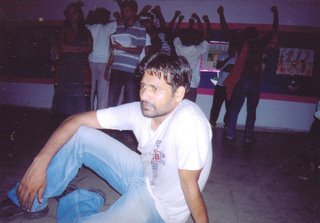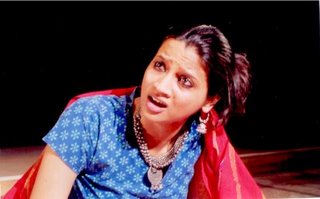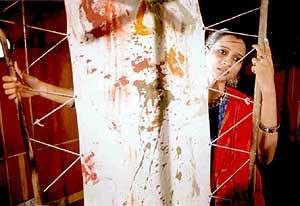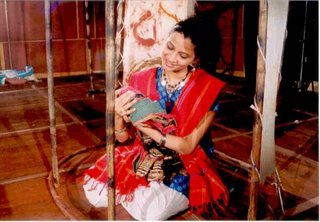
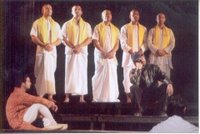 YAMA GATHA
YAMA GATHA10th January 2006,9.30pm
Abhimanch Auditorium,
N.S.D. Mandi House,New Delhi
Theatre UtsavBharat Rang Mahotsava-2006PRODUCTION DETAILS PLAY : YAMA GATHA ASMITA ARTS GROUP, DELHI
THEATRIC SIGNIFICANCE OF THE PRODUCTION ( as conceived by the director)
This play focuses on the brutality, cruelty and manipulations of the ‘ones in power’ which they exert in order to maintain their authority and domination. The main aim of the ‘system’ is to come in terms with the opposition, no matter if the opponents are sacrificed in the name of religion and under the shelter of law (!). The system leaves nothing unturned. False propaganda is frivolously used to demean the opposition.
Yama Gatha throws light on this naked truth. Though mythology forms the basis of the presentation but the content undoubtedly shows its parallel existence in contemporary world situation. The playwright Prof. Doodh Nath Singh has remarkably brought out the prevelant social and political power game situations through the medium of ‘Indra’ and ‘Pururva’. The play is a strong statement on the continuous ‘unannounced’ exploitation which third world countries suffer at hands of developed nations.
Deep rooted racial discrimination and caste hierarchies forming the basis of marginalisation, subjugation, subordination and inequality still relevant in Indian as well as global context also find wide representation in the play. Indra is the epitome of ‘World power’ and Brahmins, Rishikul and Raja are his tools in the game of power. Through these tools Indra exploits the people and gets his opponents killed by manipulative declaring them ‘agaisnt religion’ and ‘against mankind’. He calls them ‘Anarya’ and ‘Dasyu’, so as to isolate them from mainstream. ‘Yajna’ for him is an important medium of carrying forward this exploitation. Schools of serviles, parasites, music, alcohol and sex make an integral part of his ‘kootneeti’.
The play exposes the farcical, cruel and distorted face of reality of politics through Indra. On the other side Vasishtha and Pururva are striving to restore power to the people. They work together to bring light to the people; they fight for their rights and their welfare. Neither do people have enough fire to live nor do they have access to resources to survive. People are exploited by Brahmins and Purohits in the name of sacrifices and yajnas. Pururva wages war against this exploitation.
Indra fears Pururva and tries to tempt him and appropriate him and his guru Vasishtha into the system. Not succeeding in his plans he gets Pururva killed in Purushmedh Yajna under the cover of ‘Dharm Sammat Nyaya’.
Yama Gatha attacks the cruel and two faced system and politics in the name of religion. Through Urvashi and Ila, the two women characters, the question of feminine identity and Asmita comes up strikingly in this play.
The conflict between two ‘streams of thought’ or ‘cultures’; conflict between those striving for identity, recognition and survival and those engaged in politics of domination, provides strength and sets a large canvas for this play.
Yama Gatha initiates a debate and raises questions on issues related to politics of gender, race, cultural and social identity, knowledge and development. Though the storyline of this play is based on a ‘myth’ but anyone can easily identify the images of these issues in contemporary world politics.
__________________________________________
Director’s Note: What is a myth? Far away from reality…..Is it?
A commentary on existence……An unstated, un revealed compass of contemporariness of ever changing undefined, redefined, unrefined realities. Realities and reality of conflicts, sometimes we chose to close our eyes upon or forget to take cognizance of. Post-Iraq the world is not same as before. The days and months have become a game of numbers in the playfield of violence. Recently the 29/10 is the new set of numbers which has got added to our encyclopedia of violence.
What lies beneath?
Getting up to the mirror also does not help look at the reality. Whose face is this? A reflected image; an image not real. Face this. Is it easy to look at the other? Myth may be the answer.
I chose to install the myth in the modern so as to make an attempt to raise questions on the contemporary reality.
As the playwrite Doodh Nath Singh points out,’ Agar Kalidas ke utkrushta romantic ghatatop se bahar aa jayein to Pururva-Urvashi ke mithak mein bahut kuch aisa hei jisey naya arth diya ja sakta hei’.
What seems so unreal, ahistorical in a myth comes alive through this treatment and hit senses to the contemporary worldscape of exploitation, bloodshed and other forms of violence, revealing reality. This myth thus unravels the reality of our being. A commentary on existence, a reading of the myth in contemporary times.
____________________________________
ON STAGE(In Order of Appearance)
Suryabahu : Amit Rana
Krishnanag : Rohan Madhesia
Kashyap : Sandeep Srivastava
Vibhavak : Pushpraj Rawat
Vasishtha : Akhilesh Praveen
Ila : Sapna
Pururva : Ajit Kumar Mehto
Gan Pratinidhi : Rakesh Shah, Mohd. Shamim, Avdhesh Kumar, Amit Basoiya, Rahul Batra, Kartik Shah, Deepak Rajor, Nidhi Sharma, Arun Khatana, Nitin Garg, Shailendra Kumar, Vinay Kumar, Bhavna Verma, Rajesh Raj, Prabhakar Ranjan, Sanjay Chauhan, Abir Maurya, Sharad Verma, Vijay Choudhary, Aman Sharma, Tanmay
Indra : Susan Brar
Vajra : Vipin Arora
Vishwavasu : Prageet Pandit
Rishi (1) : Sunil Rawat
Rishi (2) : Abhishek Jain
Sanat Kumar : Siddharth Dubey
Urvashi : Amita Walia
Prahari (1) : Abhijeet Choudhary
Prahari (2) : Amit Basoiya
Sipahi : Rakesh Shah, Pushpraj Rawat, Sandeep Srivastava, Vijay Choudhary, Rajesh Sangwan, Mhd. Shamim, Arun Khatana, Rahul Batra, Kartik Shah, Deepak Rajor, Aman Sharma, Nitin Garg, Shailendra Kumar, Vinay Kumar, Rajesh Raj, Prabhakar Ranjan, Abir Maurya, Sharad Verma, Amit Basoiya, Avdhesh Kumar, Ratnesh Srivastava
Gramwasi (1) : Sandeep Srivastava
Gramwasi (2) : Manisha Gulati /Amit Rana
Narad : Girish Pal
Paanch Purohit : Avdhesh Kumar, Rakesh Shah, Amit Basoiya, Abhijeet Choudhary, Abhishek Jain
Anya Purohit : Sunil Rawat, Manmohan Tiwari
Mukhya Purohit : Anupam Pachauri
Kisan : Rajesh Sangwan
Raja Nabhag : Shailendra / Mohd. Shamim
OFF STAGESet Execution :Ajit Kumar Mehto, Siddharth Dubey, Amit Rana
Costume :Akhilesh Praveen, Susan Brar, Kranti Pratap Singh
Property :Girish Pal, Prageet Pandit
Production Incharge :Anupam Pachauri,Sandeep Srivastava
Music :Dr. Sangeeta Gaur
Playwright :Dhoodh Nath Singh
_________________________________________________
Scenewise Synopsis of Yama GathaScene IPururva the democratically elected representative of the people does not want to be coronated with use of same Mantra’s used to coronate Indra, the god-king. There’s debate between Ila, Vasishtha and Pururva over maintaing the wealth of tradition and vehement rejection and opposition of exploitative traditions.
The Brahmin duo whom Pururva refused give alms in exchange of singing of manras polluted with violence of Indra, plan to make best out of situation by preparing a false description of the events held and falsely implicating Pururva into using abusive words for Rishikul and Indra. They leave for Indra’s court to earn rewards with their story. Pururva declares that he is people’s representative and promises to pay heed to what people have to say. Pururva pledges to bring light, the sacred fire, for his people from Indra’s Kingdom and leaves for Amravati.
Scene IIIndra in court is planning with his Army Chief, Vajra to tempt Pururva through Urvashi, and appropriate his teacher Vasishtha by reverting the decision of his boycott by Rishi Sabha. Vasishtha arrives and refuses Indra’s offer. He says that this boycott does not matter to him.
He asks Indra very uneasy questions about his politics and people being Indra sends him to custody. Pururva arrives and asks Indra to release Vasishtha. Indra agrees and orders Vajra to release Vasishtha. Indra sends for Urvashi to meet king Pururva. Meanwhile Indra offers Somrus to Pururva. Pururva rejects the offer. Urvashi arrives in Indra’s court.
Indra gets drunk and falls to the floor. Pururva expresses his feelings understanding plight of a woman caught in a situation like Urvashi.
Urvashi asks Pururva to accept her in marriage since he understands the plight of a woman. Pururva offers to take her hand. Urvashi accepts his offer and leaves Amravati with Pururva.
Scene III Pururva has taken away Agni from Amravati.
He orders Vajra to catch Pururva.
Indra is shocked that Urvashi has left him. Urvashi has been his tool to tempt and overpower his opponents.
Indra sends off Vishwavasu, the gandhrva to bring Urvashi back to him. He asks Sanatkumar to be his messenger to Pururva.
Scene IV Sanatkumar visits Pururva’s court. While he engages Pururva and Vasishtha in the web of his words, Urvashi and her child is kidnapped by Vishwavasu.
Pururva gets caught by Vajra and his soldiers.
Scene VIndra attempts to make up with Pururva by offering him Urvashi once again. Pururva rejects his offer. Indra is furious since he realizes that Pururva has some larger aim than getting Urvashi.
Scene VIIndra’s soldiers can not find Vasishtha. Indra orders killing of Pururva through PurushMedh Yajna by implicating him falsely in cases of killing of protectors of Sacred Fire (Agni), poisoning Indra and destroyer of Yajna. He also orders inclusion of Vasishtha’s mantras in Rigved so as that Vasishtha can not contest him openly and also looses people’s support.As Urvashi arrives at the site of Purushmedha Yajna, Vishwavasu reveals to her that her son is alive. Vajra kills Vishwavasu.
Urvashi is forced to stamp the death sentence of Pururva.
The Purushmedha Yajna gets performed admist heartrending cries of Urvashi and singing of Mantras by Rishis, Brahmins and Indra’s courtiers.
_____________________________________
ABOUT THE GROUPASMITA, one of the leading Hindi theatre groups in the country, stands committed to aesthetically innovative and socially relevant theatre. Since its inception in 1993, ASMITA has carved a niche for itself in the Indian theatre scene by staging plays of varied socio-political interest while not losing out mass appeal. The group takes up contemporary issues to underline the contours of our time while providing the best of entertainment.
The group has 48 productions to its credit and on an average has been performing for about 60 nights a year. All these plays have been directed by ASMITA's Resident Director Arvind Gaur. For ASMITA, theatre has a purpose of awakening the audience to contemporary issue and creating a dialogue on prevailing social problems. ASMITA performed in all major theatre festivals of India including National School of Drama, (Bharat Rang Mahotsava),Sangeet Natak Akademi, SKP,Nandikar and Vivachana Theatre Festival, Old World Theatre Festival, Muktibodh Natya Samaroh,World Social Forum and Nehru Centre Festival Mumbai
In the past 12 years, the group has performed Girish Karnad's 'Tuglaq' and 'Rakt Kalyan', Dharamveer Bharti's 'Andha Yug', Swadesh Deepak's 'Court Martial', G P Deshpande's 'Antim Divas', Albert Camus' 'Caligula', Mahesh Dattani's 'Final Solutions' and 'Tara', Eugene O'neill 's 'Desire Under the Elms', Dario Fo's 'An Accidental Death of an Anarchist', Dr.Narenda Mohan's 'Kalandar', Bertolt Brecht's 'Good Woman of Setzuan' and 'Caucasian Chalk Circle', Samuel Beckett's 'Waiting For Godot', John Octanasek's 'Romeo Juliet and the Darkness', Neil Simon's 'The Good Doctor', Vijay Tendulkar's 'Ghasiram Kotwal', Munshi Premchand's 'Moteram ka Satyagrah', Ashok Lal's 'Ek Mamooli Aadmi', Rajesh Kumar's 'Me Gandhi Bolto', Vijay Mishra's 'Tatt Niranjana', Doodnath Singh's 'Yama Gatha', Uday Prakash's 'Warren Hastings ka Saand',
Bhishma Sahani's 'Madhavi' & Manjula Padmanbhan's 'Hidden Fires'(both solo by actress Rashi Bunny), Walking Through the Rainbow ( joint production with PCVC, solo by Rashi Bunny) & Gandhari ( solo by Aishveryaa Nidhi).
__________________________________________
ABOUT THE DIRECTOR Arvind Gaur who heads the Delhi, based Theatre group ASMITA is committed to innovative and socially relevant theatre. Starting off as a journalist and working for sometime for the electronic media, he set up ASMITA and earned a reputation in theatre circle in India and abroad.
Arvind Gaur has conducted many theatre workshops and performed in various Colleges, Institutions, Universities and Schools in India and abroad such as Stanford, Harvard Uni , Stony Brook Uni, Smithsonian (Washington DC),Nehru Centre( London) ,Jawahar Lal Nehru University, IILM , I.I.T.(Delhi) , AIMS , School of Planning and Arhitecture.
One of his production "Madhavi", solo by Rashi Bunny was recently invited at International Theatre Festival , Russia,oct.2005
Workshops for children in schools and slums as well as Street Theatre performances on different socio-political issues organized and conducted by Arvind Gaur are many in number
He has also conducted theatre workshops for Actors and Directors at Houston, USA and India Habitat Centre, New Delhi. He also performed various plays in collobration with organizations like Theatre World, British Council(Chennai), IHC, Paridhi, Bahroop,Banjara Theatre group (IIT,Khargpur),IIC, Rainbow Cavaliers, M.Dot Band (Jaipur),Vivchana (Jabalpur), Prithvi Theatre Festival(platform theatre IHC,2004) and NGOs like Mobile Creches, Action-Aid,Haq,PCVC, Deepalaya , Heinrich Boll Foundation,Asian Social Forum, Youthreach and World Social Forum.
He also designs lights for NAYA theatre under the Direction of Shri Habib Tanvir.
Director Arvind Gaur has also collaborated with various Theatre artists and Groups specially in exploring a new language for Solo performances which includes Dario fo's 'Story of the Tiger', solo by Jaimini Kumar Srivastava, 'Women in Black' by Bubbles Sabharwal and "Untitled Solo" by Lushin Dubey in collaboration with Theatre World. Not only have these plays received great audience response from important metropolis of India, "Women in black" was invited to perform in Dubai and "Untitled Solo" was performed in Chicago, Dallas, Washington DC, Boston, Rochester , San francisco, Ohio in USA and at the Edinburgh Theatre Festival last year .
"Bitter Chocolate " a new solo by Lushin was also performed at Harvard (USA) & at Nehru Centre, London and Gandhari solo by Aishveryaa Nidhi was recently performed at NIDA theatre , Sydney.
With Rashi Bunny, young actress trained in Theatre design at University of Alabama at Birmingham and Rutgers University, New Jersey, USA. Arvind Gaur Has directed three solo's .Bhishma sahani's" Madhavi ", Manjula Padmanabhan's 'Hidden Fires'and 'Walking through the Rainbow'.
Madhavi & Hidden fires has received rave reviews all over and have been invited to perform for Mahindra's OLD WORLD THEATRE FESTIVAL, Vivachana National Theatre Festival Jabalpur, Muktibodh Natyaotsav raipur, 5th National Theatre Festival Balaghat, World Social forum Mumbai and National School Of Drama (N.S.D.), Satta Festival Jaipur, Theatre Club J.N.U., PCVC, and Queen's Award Project (UK) for Communal Harmony.
Bishma Sahani's MADHAVI, Solo by Rashi Bunny and directed by Arvind Gaur, received special award for best play in experimentaion with tradition at International Solo Theatre Festival , Armenia.
contacts- 98996-50-50-9
9810-606-823
http://www.theatredirector.blog.com/
